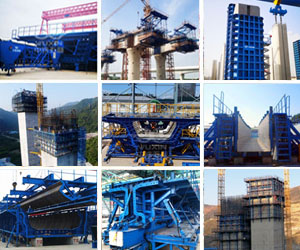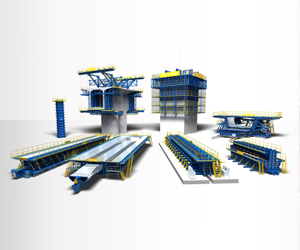Segment Box Girder Formwork
Segment Box Girder Formwork is a specialized system used in the construction of segmental box girders, typically employed in bridges and viaducts. This formwork system is designed to facilitate the casting of individual precast or cast-in-place segments that are later assembled to form the complete box girder.
Key Features of Segment Box Girder Formwork
Customizability
Designed to match the specific dimensions and profiles of each segment, including straight, curved, or tapered shapes.
Precision Engineering
Ensures dimensional accuracy for seamless alignment of segments during assembly.
Modular Design
Enables efficient reuse for multiple segments, reducing overall construction time and costs.
Surface Quality
Provides smooth finishes on both internal and external surfaces, minimizing post-casting surface treatments.
Adaptability
Suitable for various construction methods, including balanced cantilever, span-by-span, or incremental launching.
Components of Segment Box Girder Formwork
External Formwork
Forms the exterior surfaces of the box girder segment, including side walls and soffit (bottom slab).
Internal Formwork
Shapes the hollow interior cavity of the box girder.
Often collapsible or modular to allow easy removal after concrete curing.
End Shutters
Provide closure at the ends of each segment for precise shaping and proper alignment during assembly.
Support Structure
Includes falsework, scaffolding, or gantry systems to support the formwork and fresh concrete loads.
Adjustable Joints
Accommodate minor variations in geometry, ensuring a tight fit and smooth alignment of segments.
Applications
Bridge Construction
Widely used in segmental construction for highway bridges, railway bridges, and urban viaducts.
Curved Alignments
Ideal for constructing bridges with curves or varying profiles.
Precast and Cast-In-Place Segments
Suitable for both factory-controlled precasting and on-site casting.
Construction Process
Formwork Setup
Assemble the external and internal formwork components on a pre-prepared platform or scaffolding system.
Reinforcement Placement
Place steel reinforcements inside the formwork according to the structural design.
Concrete Pouring
Pour and vibrate concrete to eliminate voids and ensure a dense, strong structure.
Curing
Allow the concrete to cure to the required strength while maintaining proper moisture and temperature conditions.
Formwork Removal
Dismantle the formwork carefully without damaging the hardened segment.
Segment Erection
Transport the segments to the construction site and assemble them using techniques like post-tensioning or gluing.
Advantages
Precision and Alignment
Ensures accurate alignment of segments during assembly for a seamless structure.
Time Efficiency
Modular design allows rapid casting and reduced construction time.
Cost-Effectiveness
Reusable components lower overall material and labor costs.
Flexibility
Can accommodate complex geometries and varying segment designs.
Structural Integrity
Produces robust and durable segments suitable for high load-bearing applications.
Construction Methods Using Segment Box Girder Formwork
Balanced Cantilever Method
Segments are cast in place or assembled symmetrically from piers to maintain balance.
Span-by-Span Method
Entire spans are assembled and then lifted into position.
Incremental Launching Method
Segments are cast and then pushed forward into their final position.









